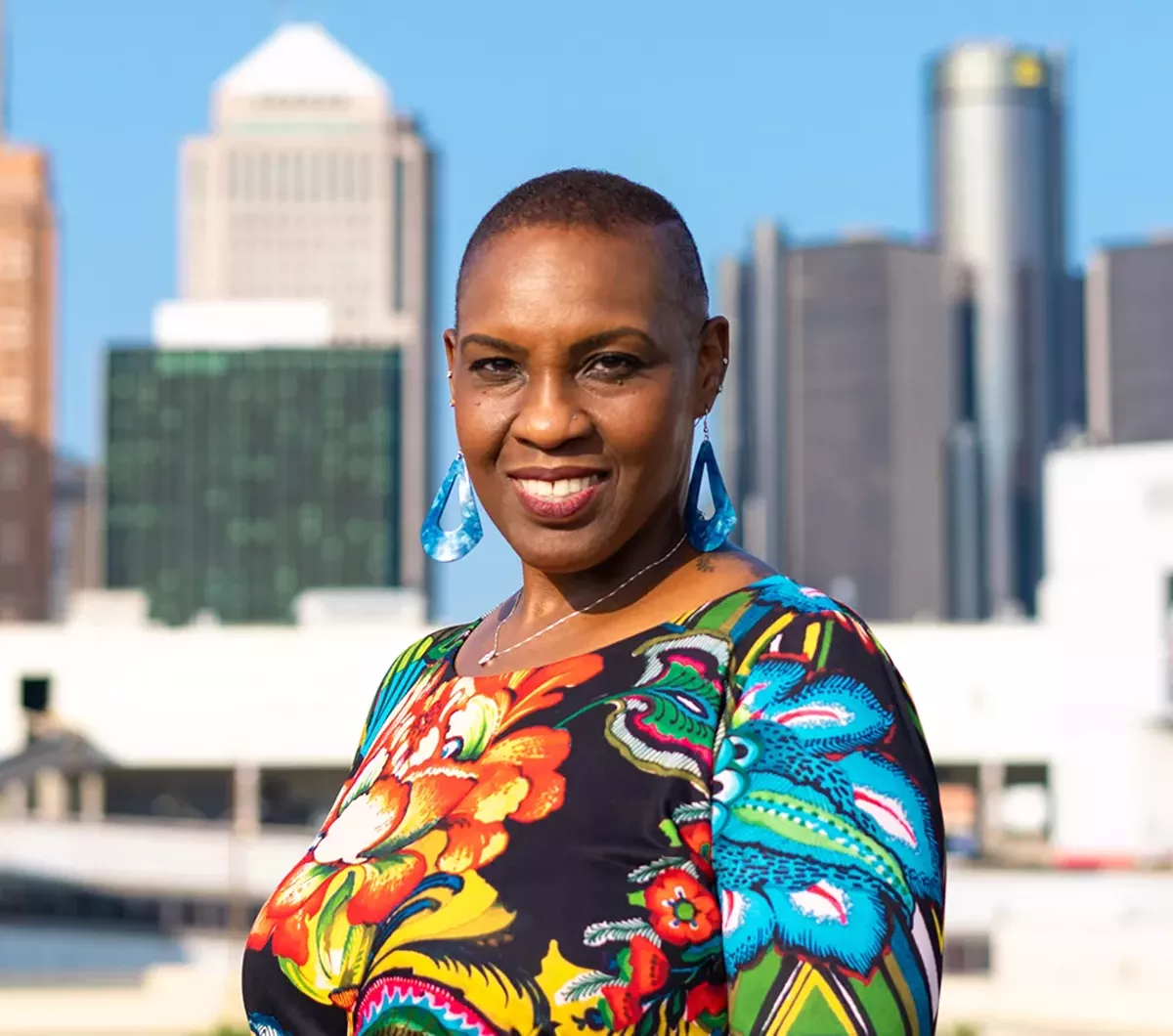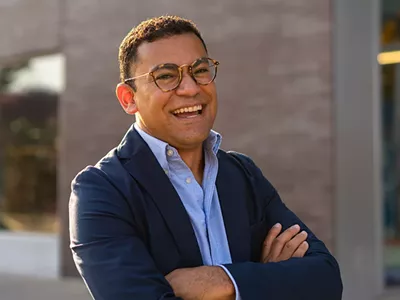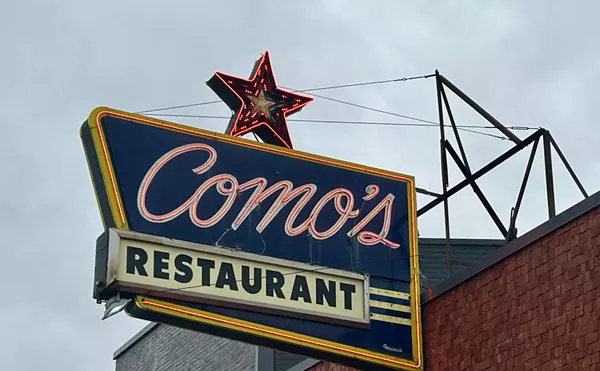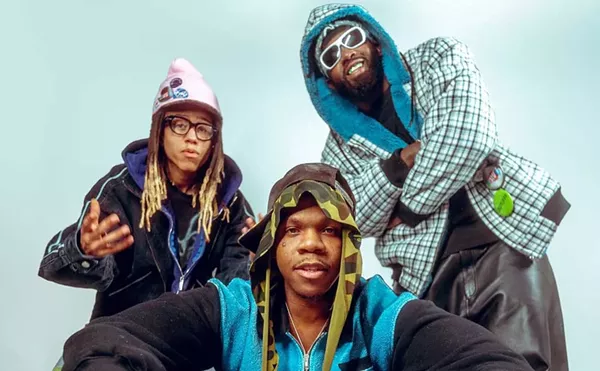

Audio By Carbonatix
[
{
"name": "GPT - Leaderboard - Inline - Content",
"component": "35519556",
"insertPoint": "5th",
"startingPoint": "3",
"requiredCountToDisplay": "3",
"maxInsertions": 100,
"adList": [
{
"adPreset": "LeaderboardInline"
}
]
}
]
Activist, educator, and survivor Kalimah Johnson is a hugger. She will tell you this almost immediately. But she always asks consent before reaching for an embrace, as her life's work is her dedication to defining boundaries, parameters, and compassion. Johnson, more than a hugger, is a healer.
Over the past 23 years, Johnson has served as a sexual assault therapist for the Detroit Police Department, taught social work at Marygrove College, served as the poet in residence for the Detroit Symphony Orchestra, and has been a consultant for national sports leagues where she has educated athletes about relationship management, domestic abuse, and sexual assault.
Johnson is now founder and executive director of the Sexual Assault Services for Holistic Healing and Awareness Center, or SASHA — a Detroit-based nonprofit offering culturally specific sexual assault support and community education and outreach. Founded in 2010, the SASHA Center is the only organization of its kind in the country.
"I want to be clear," Johnson says. "There are women of color who do this work, women of color who are leaders in this work, but they work with mainstream organizations. We have got a lot of work to do."
The work Johnson and the organization's facilitators have already accomplished is remarkable. Their current programming offers six- to eight-week group sessions as well as access to resources for one-on-one healing. Though anyone who identifies as female can attend a group, Johnson makes sure to note that the focus is always on the nuances of the African-American experience while healing from rape or assault. Much of the organization is made possible by volunteers, all of whom are required to attend six events or sessions before joining the team. SASHA also offers educational programming for "good-intentioned men" that teaches them how to have constructive conversations with other men about the treatment of women and girls.
Eight years into the SASHA Center, Johnson admits that maintaining an infrastructure remains one of the biggest challenges due to the widespread preconceived notions about black women and rape.
"It's not our fault that we were brought here as chattel slaves," she says. "We had no dominion over our bodies. There was no decision-making. 'No' was not an option. With that and having to get through Reconstruction and Jim Crow and the Civil Rights movement, and the racism we have today, people just don't see us as rape-able. If you're not a full human being, then how can I be raping you?"
One of the conflicting dynamics Johnson has noticed in her work is that black women do not tend to report sexual assault, and much of that is rooted in the treatment of black men by police and the justice system. Johnson uses Emmett Till as a verb when describing the potential consequences of reporting a crime committed by a black man, going on to explain how history has conditioned black women to forget, forgive, and move on.
"There is a stereotype of black women that they have to be strong, that God gave them more than they could handle," she says. "You carry this superwoman cape that you won't take off, and it carries you through life and then move on from it. We hold onto that to protect our community."
Though SASHA has received some financial assistance from the State of Michigan early on, there is no structure in place that would fund the center's continuous operation. Funding for SASHA has also been hard to come by in terms of independent contributions; this, according to Johnson, has everything to do with the fact that people are more comfortable funding organizations that aid in providing resources for children, people with disabilities, or cancer research — causes they can understand. "As a human being, I feel better for buying a backpack for a kid than to give you money for someone that has been raped," she says.
To help others better understand the importance behind the center's mission, Johnson teamed up with allies, both black and white, male and female, to construct what is being called the black women's triangulation of rape, or the SASHA model.
The model identifies victim blaming and rape culture that result from systemic racism, sexism, bigotry, and patriarchy — all of which surround the model's core construction. The peak of the pyramid represents demoralization and exploitation of black women and girls. The base of the pyramid details institutional barriers that keep black women silent.
The holistic portion of SASHA's healing structure is described by the founder as being agnostic and integrative — meaning the center does not follow a prescribed religion or practice. In fact, they use whatever an individual needs to further their journey, from sage-smudging to meditation.
"We're not going to tell you how to feel about your rape," Johnson says. "You can feel how you want to feel. We're here for you. Some people are more cerebral, more internal. Others are very external. You get to decide how to heal. We just want to create a safe space for all of that. You need a Bible? We got that. You need a chicken foot? We got that, too."
Looking to the future, Johnson would like to accrue enough funding to incorporate something that has been vital to her own healing as a survivor. After tracking her family's migration patterns when they were slaves, Johnson discovered the plantation they were enslaved to, and the descendants of the family that owned them. In 2004, Johnson visited the plantation.
"It offered healing. It offered integration, a sense of power, forgiveness, reconciliation, and love," she says of the experience. "I want that for everybody."
"Healing is a commitment we have to make to ourselves," she adds. "People recognize that they are not in it alone. Even if you can't talk to a creator, or talk to a god, maybe you can talk to an ancestor. They're still with you. How can you tap into that strength?"
But for now, Johnson's mission is firmly rooted here at home, where she says she is still building the plane while flying it, a phrase she frequently uses to describe SASHA Center's ongoing evolution.
"I was born and raised in this city, educated in this city, dropped out of high school in this city, got raped in this city," she says. "I just feel like my way, or our way, is to give back to the city to provide spaces for healing."
From our 2018 People Issue.
Next: The Curators.
Previous: The Heart.
Stay on top of Detroit news and views. Sign up for our weekly issue newsletter delivered each Wednesday.





